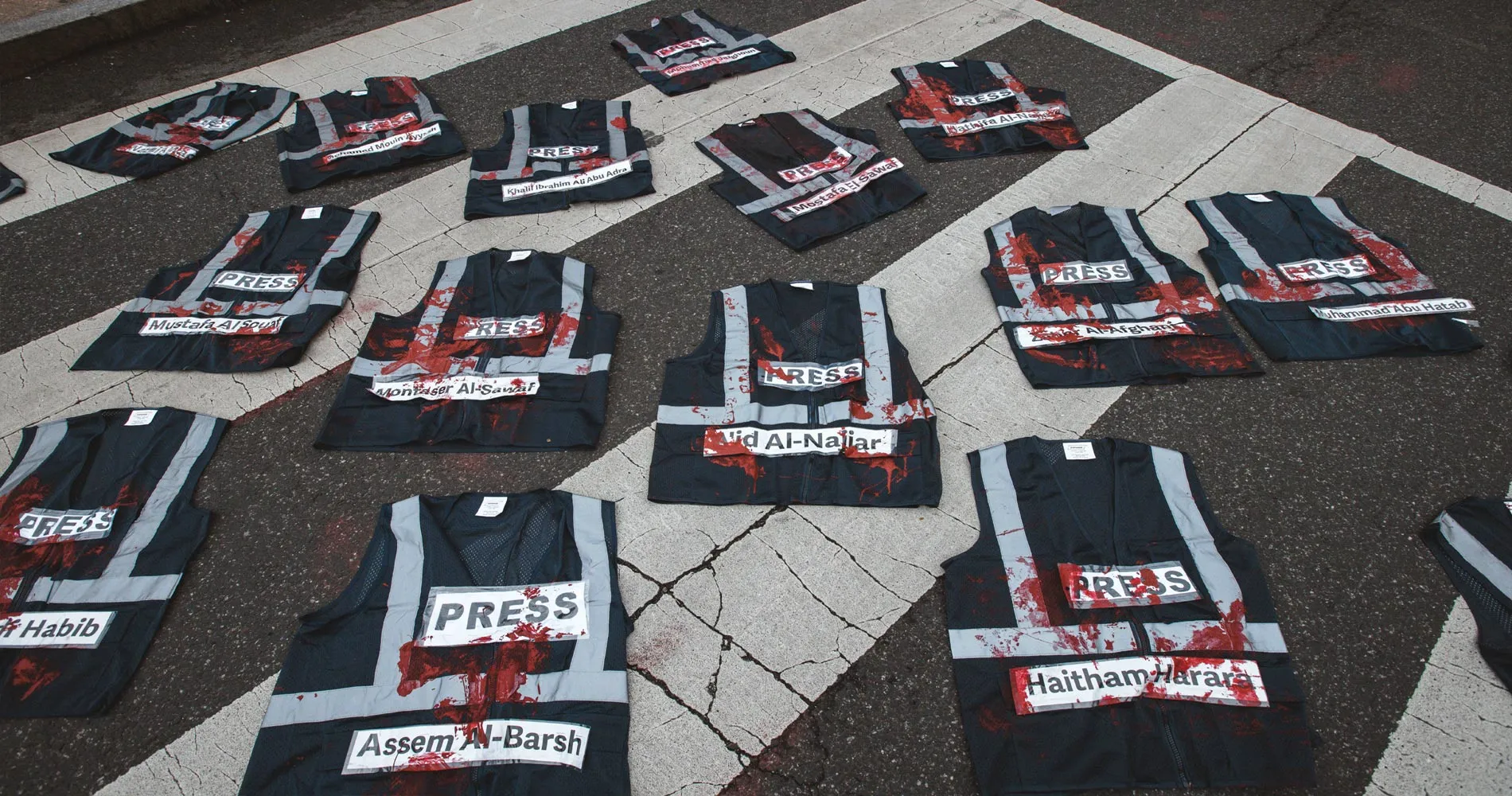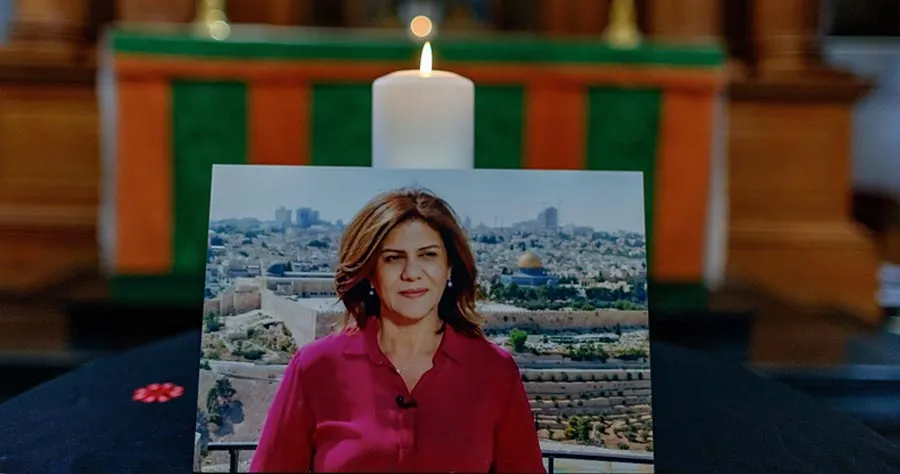In the midst of the ongoing Israel-Hamas conflict in the Gaza Strip, journalists are confronted with unprecedented dangers, with over 140 people losing their lives since October 2023. Despite repeated calls by the UN for a ceasefire, the violence continues, resulting in loss of life and destruction of vital infrastructure. Israel’s inability to guarantee the safety of journalists further exacerbates the perilous situation. Meanwhile, legislative measures in Israel aimed at constraining news outlets are raising significant concerns about press freedom.
Murat Gibadyukov
30 April 2024
Arabic version | German version | Spanish version
The Gaza Strip, a land known for its long-running conflict with Israel and a tense political environment, is currently facing the worst situation in decades as a result of the war that began on 7 October 2023. The war that has unfolded in this narrow strip has brought destruction and suffering and, most tragically, claimed the lives of thousands of people, including journalists and media workers.
According to the report of the Committee to Protect Journalists (CPJ), since the beginning of the war, out of more than 35 000 deaths in the Gaza Strip and West Bank and 1200 deaths in Israel, there have been at least 97 confirmed deaths of journalists and media workers. Concurrently, the Government Press Office in the Gaza Strip has reported that more than 140 journalists and media workers have been killed since the conflict began in 2023.
This is a staggering statistic that underscores the dangers and unprecedented risks faced by journalists in Gaza when trying to cover the conflict. Not only are they targeted by the shelling of the IDF (Israeli Defense Forces) but they are also censored, threatened, arrested, and even killed.
Despite a UN Security Council resolution adopted in March 2024 calling for “an immediate ceasefire and the unconditional release of all hostages,” the bombardment of Gaza by Israel continues, claiming not only the lives of civilians but also those of journalists who risk their lives to bring information to the world. The situation is becoming even more apocalyptic as Gaza’s infrastructure is destroyed and residents are forced to flee the bombing and destruction, increasing fears of starvation and a deepening the humanitarian crisis. Journalists are faced with the choice: stay and risk their lives to bring the truth to the world, or leave and lose the opportunity to cover such important events.
Israel has stated that it cannot guarantee the safety of journalists working in the Gaza Strip, which creates even greater challenges for those who seek to report objectively on events in the region. This was proven on 11 May 2022, long before the Hamas attack on Israel, when a prominent Palestinian-American Al Jazeera reporter, Shireen Abu Akleh, was killed by an Israeli soldier while wearing a blue press vest.
The CPJ is investigating numerous cases of killings, disappearances, arrests, and threats from the Israeli military against journalists in Gaza. Many of these cases remain unconfirmed, but they are a reminder of the harsh reality faced by those on the front lines covering the conflict.
Ultimately, the killing of journalists in Gaza not only eliminates important voices and sources of information but also undermines the foundations of democracy and press freedom. It is a reminder of the need to respect and protect journalists who bravely stand on the front lines so that we can better understand and learn about the world .
“Since the Israel-Gaza war began, journalists have been paying the highest price—their lives—to defend our right to the truth. Each time a journalist dies or is injured, we lose a fragment of that truth,” said CPJ Program Director Carlos Martínez de la Serna. “Journalists are civilians who are protected by international humanitarian law in times of conflict. Those responsible for their deaths face dual trials: one under international law and another before history’s unforgiving gaze.”
Israel is not only targeting journalists on the battlefield but also jails them. Following the Hamas attack on October 7, Israel has emerged as one of the world’s leading jailers of journalists. According to the Committee to Protect Journalists’ 2023 prison census, Israel ranked sixth—tied with Iran—behind China, Myanmar, Belarus, Russia, and Vietnam. “This is the highest number of media arrests in Israel and the Palestinian territories since CPJ began tracking imprisonments in 1992.” No Israeli journalists were jailed. Palestinian authorities have not jailed any journalists. One of the most prominent jailed Palestinian journalists is Alaa al-Rimawi, head of J-Media, a West Bank-based news agency. He was jailed less than two weeks after October 7. Israeli forces raided his home on October 19 and detained his son. Alaa al-Rimawi surrendered later that day and has been jailed since. Israel banned J-Media on security grounds.
At the same time, Israel is taking legislative action that raises serious concerns about press freedom. The Knesset, the country’s parliament, has approved a law allowing the closure of hostile media outlets in the country. Seventy-one lawmakers voted in favor of the law, while ten voted against it. According to the new law, Israel’s communications minister, with the approval of the prime minister, can decide to stop foreign channels from broadcasting in the country if it harms the security of the state. These are measures that have raised concerns among human rights organizations and the international community.
The laws and regulations adopted are primarily directed against the Qatar-funded Al Jazeera TV channel. Israeli Prime Minister Benjamin Netanyahu has even called the channel “the mouthpiece of Hamas.” “Al Jazeera harmed Israel’s security, actively participated in the October 7 massacre, and incited against Israeli soldiers. It is time to remove the bullhorn of Hamas from our country,” Netanyahu said on X, formerly Twitter. “The terror channel Al Jazeera will no longer broadcast from Israel,” he said.
This week, for the first time, Qatari authorities invited Israeli journalists to Doha to interview Majad al-Ansari, advisor to the prime minister and spokesman for the Qatari Foreign Ministry. The Qatari diplomat stressed in the interview that the Qatari government assumed the role of mediator between Israel and Hamas back in 2006, at the request of the United States, and “sheltered” in Doha the leaders of the terrorist organization only for the sake of preserving this channel of unofficial negotiations between the two warring parties.
Al-Ansari rejected Israeli accusations that Hamas used Qatari money to finance terror, calling them extremely dishonest. He claimed that all transactions went through Israeli authorization and were subjected to rigorous scrutiny. A large portion of the grants remained in Israel and were used to supply electricity, fuel and water to Gaza. Qatar, according to the Foreign Ministry spokesman, funded the needs of Hamas-ruled Gaza in order to maintain a decent standard of living for the population and prevent an escalation of the conflict.
The defensive stance and adoption of new laws in Israel raise questions about the extent to which the Israeli legislation is aimed at ensuring the security of the state and the extent to which it is aimed at restricting freedom of speech and access to information. The situation in the Gaza Strip and restrictions on press freedom in Israel pose a threat to information independence and truthful reporting, a reminder of the importance of protecting press freedom as a fundamental principle of democracy and human rights.








